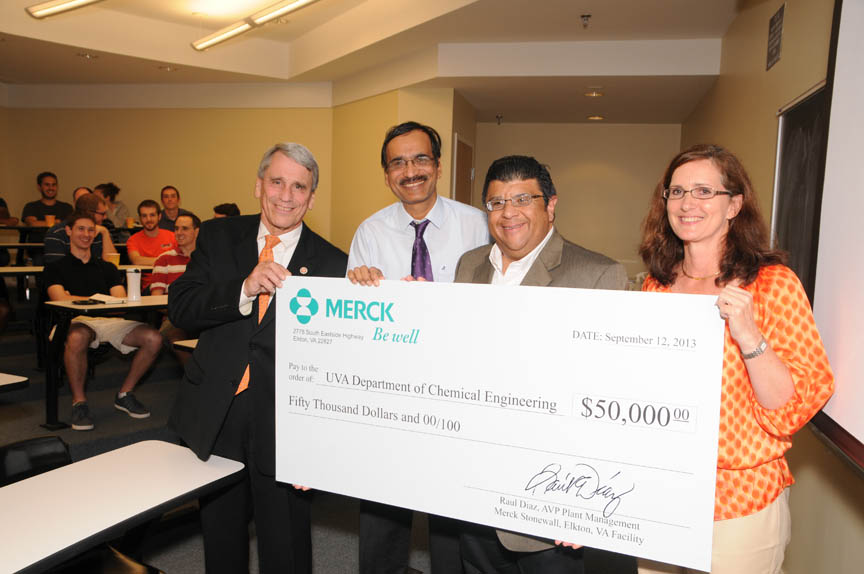Ever since Merck & Co. opened its Stonewall Bio/Pharmaceutical Operations facility in the Shenandoah Valley community of Elkton, the relationship between the company and the University of Virginia’s Department of Chemical Engineering has been close and mutually beneficial – sustained by what Raúl Diaz, Merck’s associate vice president and Elkton plant manager, calls an “ongoing conversation.”
It is a conversation that has led to innovation. After discussions with professor Roseanne Ford, the department’s chair, Merck has earmarked its latest $50,000 donation to the department to help a newly hired assistant professor recruit a graduate research assistant.
“We are not aware of any other company making a gift for this purpose,” Diaz said. Another result of this conversation: A trio of Elkton engineers taught an advanced biotechnology course for the department last fall.
“Merck has been both a loyal and helpful partner,” Ford said. “Over the years, the company’s generosity has been instrumental in helping us elevate the quality of the education we offer and provide new avenues for faculty research.”
Merck has also benefitted. “Through its University connection, Merck has gained access to talented young engineers with the skills to contribute in many ways to our businesses,” Diaz said. “And from time to time, we have tapped faculty expertise to help address issues at the plant.”
According to University estimates, 132 U.Va. alumni are currently Merck employees, almost half of whom are graduates of the School of Engineering and Applied Science.
Ford is particularly excited by Merck’s latest gift, especially at a time when the department is hiring new faculty members.
“One challenge for new assistant professors is to produce research results as quickly as possible so they can secure external funding,” she said. “Merck’s support for a graduate student will help them accelerate this process.”
Merck’s responsiveness to specific department needs also led Merck engineers to agree to step in and teach “Biochemical Engineering Principles,” an elective in the department’s bio-concentration, when a faculty member retired prematurely. “The course attracted a large group of students who value the experience of learning from engineers who could bring on-the-job experiences to the classroom,” Ford said.
Thomas Hoerner, a 1986 U.Va. chemical engineering graduate who taught the class with Thomas Potgieter and 1985 U.Va. chemical engineering alumnus Abhay Kirpekar, noted that the course gave him the opportunity to take a first look at talented undergraduates.
“Being in the classroom with them gave us a window into what they can do,” he said.
Promising third-year students can apply for a Merck internship. Selected students receive a Merck Engineering & Technology Fellowship, which includes a $5,000 grant to be applied to a student’s university fees.
But as Ford is quick to point out, Merck’s contributions to the department have been both varied and far-reaching. They have included, among other initiatives, support for laboratories, a lecture series, sponsorship of the student American Institute of Chemical Engineers chapter and funded research for faculty members.
“In virtually every way, Merck has had a significant impact on the department and our students,” Ford said. “It means a lot to us.”
— by Charlie Feigenoff
Media Contact
Article Information
January 28, 2014
/content/ongoing-conversation-merck-uva-engineers-find-relationship-mutually-beneficial

